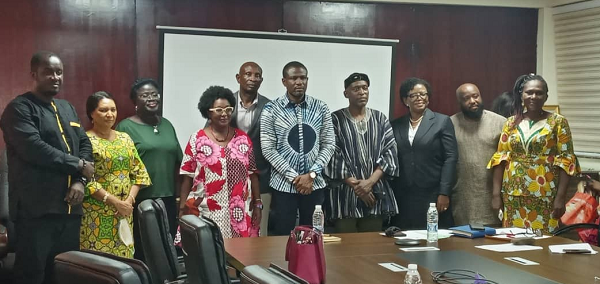
Ghana needs protected folklore to drive tourism - Okraku Mantey
The Deputy Minister of Tourism, Arts and Culture (MoTAC), Mark Okraku Mantey, has underscored the need for Ghana to have protected folklore in order to help drive the country’s tourism and creative arts industry.
For him, if the country failed to have a strong folklore, it would negatively affect the country’s culture, creative arts and tourism.
Mr Okraku Mantey made the call when he inaugurated the Governing Board of the National Folklore Board in Accra on Monday, February 14, 2022.
Board members
The board, with the mandate to help facilitate the work of the National Folklore Board, which is a statutory body established and mandated under the Copyright Act, 2005 (Act 690) (the “Act”), to administer, register, promote and protect Ghanaian expressions of folklore on behalf of the President and for the people of Ghana, is chaired by Professor Abdulai Salifu Asuro.
The board has Madam Bernice Ann Deh-Kumah, Executive Director of National Folklore Board; Madam Yaa Attafua, Copyright Administrator; Mr Enoch Yaw Oduro-Agyei; Mr Philip Boakye Dua Oyinka; Madam Amy Frimpong; Madam Joseph Ohene-Osei, and Madam Sarah Norkor Anku as members.
Folklore is the body of culture shared by a particular group of people—it encompasses the traditions common to that culture, subculture or group.
Tourism development
Mr Okraku Mantey said folklore plays a key role in the development of the country’s tourism and cultural industry.
“I agree that if we do not have a strong folklore or protected folklore, then what we want to use to drive culture will suffer. When culture suffers, it affects the creative industry,” he said.
He said if the creative industry suffers, tourism would be badly affected and that would have a toll on the Ministry’s target to become the biggest contributor to the country’s economy.
“We all know where President Akufo-Addo wants to take tourism and culture to; we all know his passion for this industry,” Mr Okraku Mantey noted, adding that “if we are unable to build the foundation, which is folklore, this target, I am afraid, will not be achieved.”
He was of the view that the board was very critical to maintaining the country’s culture as well as for helping to boost the country’s tourism industry.
Call to action
He has, therefore, challenged the board to deliver their mandate as expected to help drive the National Folklore Board into prosperity, saying “you didn’t just get here, it is because of what you are known for and what you’ve done over the years.”
For his part, Prof. Asuro pledged the commitment of the board to help drive the National Folklore Board into prosperity.
For him, folklore was critical to the very survival of the country, calling on the Ministry to fast track the processes of getting the national folklore policy.
